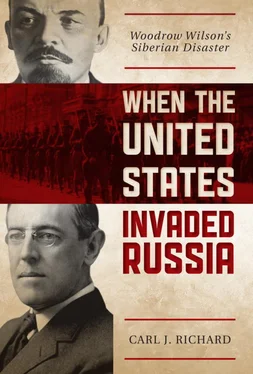These factors had already convinced Secretary of State Robert Lansing that there was no need for alarm. It is true that, on March 24, Lansing was upset enough to write to the president, “If the reports, which persist, that the military prisoners in Siberia are organized under German officers and have succeeded in occupying Irkutsk are confirmed, we will have a new situation in Siberia which may cause a revision of our policy.” But the fact that the secretary of state envisioned the potential validation of these reports as creating a “new situation” indicates that he doubted their accuracy, and the wild rumor concerning the occupation of Irkutsk by German prisoners was soon proved false. Even more instructive is the notation that Lansing’s memorandum bears: “This was returned to me 3/26/18 by the Prest. who said that he quite agreed but did not think the situation yet warranted a change of policy.” Indeed, there was no change of policy for several months, despite the persistence of the rumors. On April 22, Lansing submitted to Wilson a state department memorandum that declared, “There is no indication… that the arming of prisoners is extensive.” Regarding the prisoners, the memorandum mentioned reports of “numerous instances of disaffection among the Austro-Hungarians—both of officers and of men—towards their own government.” On April 30, Lansing told Japanese Ambassador Ishii Kikujiro that the prisoners had even “conspired with the Bolsheviks to arrest and kill their own superiors, the German officers.” [9] U.S. Department of State, Papers Relating to the Foreign Relations of the United States: The Lansing Papers, 1914–1920 (Washington, D.C.: Government Printing Office, 1939–1940), Lansing to Woodrow Wilson, March 24, 1918, vol. 2, 357n47; Link, Papers of Woodrow Wilson , Robert Lansing to Wilson, April 22, 1918, vol. 47, 399; Ishii Kikujiro to Shinpei Goto, April 30, 1918, vol. 47, 473.
Wilson’s actions reveal his doubts concerning the war prisoner allegations. Lansing’s memorandum regarding the July 6 White House meeting in which Wilson announced his decision to intervene is important in this regard. Wilson’s only mention of the war prisoners at the meeting was his declaration that public announcements regarding intervention should focus on the need to prevent the war prisoners from controlling Siberia. In Wilson’s July 17 aide memoire , his formal statement announcing his decision to intervene, intended for distribution to the Allied embassies, there is no mention of war prisoners. But in the August 3 paraphrase of the aide memoire , intended for distribution to the press, the war prisoners reemerge, and, in fact, are presented as the primary motive for intervention. In short, it is clear that Wilson, having decided on intervention for other reasons, seized on the war prisoner rumors as justification to the press for his decision to intervene. Wilson’s political instincts told him that he could deflate the inevitable opposition to Siberian intervention by utilizing public war hysteria. [10] U.S. Department of State, Foreign Relations, Russia, 1918 , July 6 Lansing memo, vol. 2, 262–63; July 17 aide memoire , vol. 2, 287–90; August 3 paraphrase, vol. 2, 328–29.
It should be noted here that Lasch also contended, as a subordinate part of his theory, that a contributing factor to Wilson’s decision to intervene was his belief in the authenticity of the Sisson Documents. Edgar Sisson was the former city editor of the Chicago Tribune who had been sent to Russia in the winter of 1917–1918 to aid the Committee on Public Information’s Russian Bureau in its efforts to restore Russian enthusiasm for the Allied war cause. Throughout the month of February 1918 Sisson purchased from an anti-Bolshevik journalist photographs of documents purporting to demonstrate that top Bolshevik leaders, including Vladimir Lenin and Leon Trotsky, were acting as paid agents of the German General Staff. These photographs had allegedly been stolen from Bolshevik party files. The photographs bought by Sisson were different from those previously purchased by Ambassador Francis in that the new ones indicated that the Bolsheviks were still acting as paid agents of the German government after the Bolshevik Revolution. (The Germans had indeed transported Lenin from his place of exile in Zurich to Petrograd after the March Revolution and had given him some financial support, an excellent investment given his subsequent withdrawal of Russia from the war. As Lenin himself put it, in a letter to a Bolshevik representative in Sweden in August 1918: “Nobody ever asked the Germans for help, but we had an understanding…. There was a coincidence of interests. We would have been idiots not to have taken advantage of it.”) When Sisson pressed for additional evidence, he was sold fourteen “originals.” All but one of the fourteen documents were alleged to have been stolen from the “secret offices” of the German General Staff in Russia. Sisson arrived in Washington in May 1918 with the fourteen “originals” and fifty-five photographs of documents. [11] George F. Kennan, “The Sisson Documents,” Journal of Modern History 28 (June 1956): 130–31; John Keegan, The First World War (New York: Alfred A. Knopf, 1999), 338–39; Ilya Somin, Stillborn Crusade: The Tragic Failure of Western Intervention in the Russian Civil War, 1918–1920 (New Brunswick, N.J.: Transaction, 1996), 13.
Leaving aside the lack of evidence that Wilson and Lansing believed in the authenticity of the Sisson Documents, one wonders at the credulity of anyone who so believed. To believe in their authenticity was to believe that Bolshevik leaders were completely subservient to the Germans at the same time that the Red Army was resisting German advances into Soviet Russia; that the Brest-Litovsk negotiations were completely fraudulent; that Bolshevik leaders had managed to keep their complete subservience to Germany a secret from other Bolshevik officials and from the Russian public for a long period of time; that the German General Staff maintained two secret offices in Russia for an equally long time without leaving a hint of their existence; that German officials would casually list the names of Germany’s agents in routine dispatches in the middle of a war, including the names of those Bolsheviks whom they desired to be elected to the Soviet Central Committee; that these sensitive documents would be kept in Bolshevik party files where anyone might see them; that German officials would write with impeccable grammar in the Russian language yet use archaic words when writing in German, when, as State Department officials well knew, even the Soviet government seldom wrote diplomatic communications in Russian; that German officials would sign their names in Cyrillic characters rather than in the modern Latin alphabet standard in Germany and the rest of the Western world; and that German officials would date their documents according to the Julian calendar used in Russia rather than the Gregorian calendar used in Germany and the rest of the West, though such a practice would cause confusion in German files. In short, nearly everyone who scrutinized the Sisson Documents regarded them as laughable forgeries. Lockhart, the British envoy to the Bolsheviks, later wrote that they were “so palpably forged that even our own secret service would have nothing to do with them.” He added that within months of the surfacing of the documents, it had been ascertained that letters supposedly written by different individuals in various European cities had actually been written on the same typewriter. [12] Kennan, “Sisson Documents,” 134, 138–40; Lockhart, British Agent , 219, 229.
Indeed, the State Department enraged Sisson by showing little interest in his documents. Department officials knew that documents of dubious authenticity concerning the Bolsheviks had been floated by anti-Bolsheviks even before the November Revolution. Thus, the State Department declined to have the documents published, though many department officials despised the Bolsheviks. Although some of their reluctance to publish stemmed from apprehensions about Bolshevik reprisals against Americans in Russia, State Department officials also knew that the documents were such obvious forgeries that their publication would prove more harmful than helpful to the administration. Secretary of State Lansing told Wilson’s closest adviser, Colonel Edward House, that he did not accept their authenticity, and House agreed. Even Ambassador Francis, who first transmitted their text to the State Department, declared that he did not believe they were authentic. He believed that while the Bolsheviks were willing to accept financial aid from the Germans, or anyone else for that matter, they used such aid to promote their own goal of global revolution. He noted that the Bolsheviks were resisting German incursions in the Ukraine, Finland, and the Baltic States at the time. [13] Kennan, “Sisson Documents,” 131; Link, Papers of Woodrow Wilson , David R. Francis to Robert Lansing, February 13, 1918, vol. 46, 341; Robert Lansing to David R. Francis, February 18, 1918, vol. 46, 373n5; Diary of Colonel Edward House, September 24, 1918, vol. 51, 104.
Читать дальше












